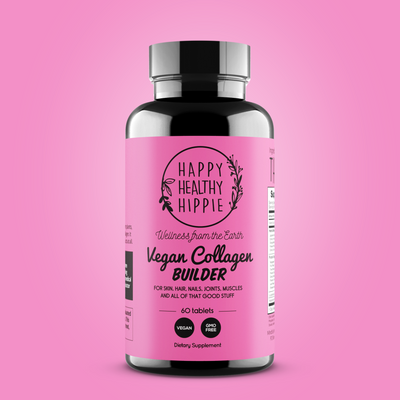
Collagen is an essential protein the body naturally produces that holds together your muscles, bones, ligaments, and skin.
With age, though, collagen’s natural production gradually decreases. Besides aging, factors like smoking, sun exposure, and sugar also lower collagen levels over time.
This causes your skin to wrinkle, muscles to become more sensitive, and bones to grow more brittle. That’s why it’s crucial everyone eats foods high in collagen for long-lasting healthy skin and strong bones.
Now, this is where it gets tricky for vegans.
Why? Collagen is a protein only found in animals. So far, there is no known vegan source of it.
So what’s the solution for those who don’t consume dairy products and meat? Are there any vegan collagen supplements available? What are some ways that vegans can boost collagen, without consuming meat?
That’s exactly what we’ll be covering throughout this guide.
Read along to learn about:
- Can Collagen Be Vegan?
- Benefits of Vegan Collagen
- Other Ways to Boost Collagen (Without Meat!)
- FAQs on Vegan Collagen
Can Collagen Be Vegan?
Short answer: no.
Collagen is 100 percent animal-based, as it can only be found in animal products, such as bone broth, fish, chicken, eggs, and other dairy products.
Long answer: yes, but not naturally, and the product isn’t available to consumers yet.
Scientists have been working on ways to genetically modify yeast and bacteria so they can create cruelty-free “vegan” collagen.
More specifically, they’ve found that the bacteria P. pastoris, is the best option for genetically engineering high-quality collagen. They’ve added four human genes to the bacteria, along with pepsin, a digestive enzyme, to get an end product that is the exact structure of human collagen.
The bad news is, these products are being produced in relatively small amounts, and in medical settings, so they’re not widely available for people to buy. As a result, they’re very expensive to purchase and lack adequate research that supports their use.
Now, although you can’t yet find pure collagen that’s not derived from animals, you can use plant-based products that boost your body’s natural collagen production. Let’s check out all of the benefits that these products provide.
Benefits of Vegan Collagen
Because vegan collagen products are made out of plant-based components, their benefits go beyond collagen production. They can also:
- Strengthen bones, joints, and muscles
- Boost your energy levels
- Support your immune system’s cellular function
- Relieve stress and anxiety
- Protect your liver
- Reduce signs of aging
If you need help fighting off your stress, check out our list for the 9 best, natural stress relief supplements that can help reduce your stress, today.
Other Ways to Boost Collagen (Without Meat!)
#1: Try A Vegan Collagen Builder

Our Vegan Collagen Builder contains an intentionally curated collection of herbs, fruits, veggies, and minerals, that help boost collagen, keratin, and elastin production within your body. Some of these nutrients include:
- Vitamin A
- Hyaluronic acid
- L-Lysine
- White tea extract
- Cilantro leaf powder
- Raspberry fruit extract
- Guava fruit powder
- Sour cherry fruit
This natural and vegan-friendly solution supports you by promoting healthy hair, glowing and softer skin, as well as stronger nails, and muscles.
Take two tablets a day, every day, preferably with your food for maximum absorption.
#2: Aloe Vera

Ever wondered why aloe vera is widely known for its healing and soothing properties? That’s because the aloe vera plant increases collagen production in the skin, which helps reduce your wrinkles, treats cuts and burns, improves skin elasticity, and gives your skin an overall radiant glow.
You can apply aloe to your skin either in its purest form (directly from the plant), or as a cream, oil, moisturizer, and any other variation that the market contains.
If you’re looking for, let’s say, a skin-healing moisturizer after a long day of sun exposure at the beach, you can pick an aloe vera aftersun lotion at your local pharmacy or drugstore.
#3: Nutritious Diet

The body needs vitamin C, zinc, copper, and the amino acids glycine, lysine, and proline to produce collagen on its own.
Luckily, there are many vegan foods that contain these vitamins and nutritions. Some we’d recommend incorporating into your diet to boost collagen include:
- Legumes such as black beans, kidney beans, and chickpeas.
- Nuts and seeds such as peanuts, pistachio, cashew, chia seeds, pumpkin seeds, sunflower seeds, etc.
- Greens and veggies such as salad, spinach, cabbage, broccoli, kale, and tomatoes.
- Fruits such as citrus fruit, kiwi, mango, watermelon, strawberries, blueberries, and papaya.
- Whole grains such as rice, corn, and wheat.
If you want to learn more about nutrition, head over to our guide on 11+ best foods for a hormone balance diet.
FAQs on Vegan Collagen
#1. Is There a Vegan Source of Collagen?
No, there isn’t any vegan source of collagen, as all collagen is derived from animals.
There are, however, vegan foods and supplements that have the ability to promote collagen synthesis.
Scientists have also been working on a way to genetically modify yeast and bacteria into producing blocks of human, vegan collagen. Others are trying to find ways to bioengineer it.
These variations are very expensive and hard to come by, though, as they’re not thoroughly researched yet and most companies just sell vegan collagen builders/boosters.
#2. How Do Vegans Get Collagen?
Vegans can support their collagen production by consuming foods high in Vitamin C, zinc, glycine, lysine, and proline.
These include:
- Strawberries
- Broccoli
- Citrus fruit
- Asparagus
- Mushrooms
- Beans
- Nuts and seeds
Besides food, vegans can also take vegan collagen powders, gummies, and supplements to boost their collagen production.
#3: Where Can You Buy Vegan Collagen?
As of right now, consumers can’t buy vegan collagen supplements. However, you can purchase supplements that boost the natural production of collagen, instead. These contain vitamins and minerals such as vitamin C, zinc, lysine, glycine, and proline.
#4: What’s the Difference Between Vegan Collagen and Animal Collagen?
Vegan collagen is still a new and undeveloped product, and hence, most of the pros and cons surrounding it are beliefs and speculation.
Many believe that vegan collagen will have a lower risk of allergies than animal collagen because it’ll be produced in a lab environment. For that same reason, they also believe that it’ll be a healthier and safer alternative.
#5. Do Vegan Collagen Boosters Really Work?
Yes, vegan collagen boosters have proven to be highly effective.
They’ve been shown to stimulate natural collagen production, reduce the presence of wrinkles, as well support digestive health.
#6. What Food Has the Most Collagen?
The most collagen-rich food is bone broth, made out of chicken, cattle, or fish. The soup is a great source of amino acids, promotes gut health and digestion, supports weight loss and your immune function, and even helps you fall asleep.
Our VEGAN COLLAGEN BUILDER is a natural & vegan-friendly solution that supports you by:
- Promoting glowing skin, healthy nails, and beautiful hair.
- Boosting your body's natural production of collagen, keratin, and elastin.
- Completely plant-based and vegan-friendly
- Contains 35 powerful, pure herbs, fruits, veggies, and vitamins
Try it risk free with our 60-Day Money Back Guarantee.
#7. What Fruits Are High in Collagen?
Foods rich in vitamin C are all high in collagen and nutrients.
These include:
- Citrus fruit such as oranges, grapefruit, lemons, and limes
- Berries
- Tropical fruit such as kiwi, mango, and pineapple
Key Takeaways
So far, there’s no known natural source of vegan collagen. But scientists are working on ways to bioengineer it with plant-based elements such as yeast and bacteria. This vegan collagen product is still new and under improvement, which makes it too expensive as well as unavailable for the regular consumer to buy.
On the bright side, as a vegan, there’s plenty of fruits, veggies, vitamins and vegan collagen boosters you can consume to help your body produce collagen on its own. These goods are great for improving your skin health, strengthening your bones and muscles, and supporting your overall immune system’s functionality.


